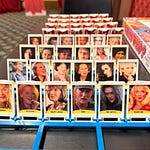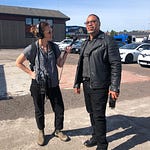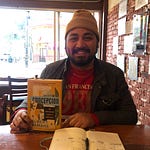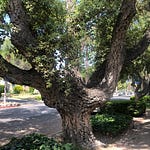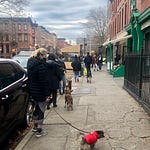Hello, everyone, welcome to Loitering, the occasional but lovable traveling mini pod I am currently testing in newsletter format. And today I am loitering on the couch with a very special guest. Can you please introduce yourself?
Monica — 0:26 : Hi, my name is Monica Villavicencio, and I met Sonia when I was living in San Francisco, and now she's here with me on my couch in Atlanta, Georgia, where I moved two months ago.
Sonia — 0:38 : Okay, so we're here in Atlanta. But Monica, aside from San Francisco, you've lived in a lot of different places.
Monica — 0:45 : Yeah, I've lived in a ton of places. Aside from Atlanta and San Francisco, I've lived in Washington, DC, New York, Tokyo, London, and LA, and with shorter stints in the Philippines, and Chicago.
Sonia — 1:02 : Wow, that is quite a number. First question is, where do you consider home?
Monica — 1:09 : That's a complicated question. And something I have wrestled with a lot. And I feel like if you'd asked me even two years ago, I would have had a different answer. But right now, right now I'm in a, like, in a phase of feeling like home is just wherever I am, wherever I live. So I guess, home is here in Atlanta, although it still feels like a new place. And I don't know that many people yet. But that's basically how I feel these days.
Sonia — 1:40 : Wow. And so where would you consider your roots, though? Like, the, the roots that made you consider what home first might be?
Monica — 1:49 : Yeah, that's also a complicated question, because my parents live in Virginia, just outside of DC. So when people ask me, where are you from, I always say, Virginia, just because I don't really know how to answer otherwise. And that's where I went to high school. But it's also really interesting, because I just came off of almost seven years in California. And I also spent my first nine years in California and LA. So it's like, the West Coast -- I feel like I have strong roots in San Francisco and where I was born, and LA, and also on the East Coast, in like the Washington DC area. And all I can say about that is kind of for the first time in a long time, I feel pretty comfortable saying that my roots extend from one side of the country to another. And that feels like that's the only narrative that's going to make sense for me.
Sonia — 2:44 : What was the tipping point that made you realize that you could say that you're from these two places across the country?
Monica — 2:52 : I think a big part of it was the decision to move here and the process of moving here, because I went to San Francisco with this idea of, I needed to build a home, and I needed to build roots of my own. Roots of my own that were my choice, and not just wherever my parents happened to be. And it was a good home for a while. But when I realized it wasn't fitting me anymore, and it wasn't fitting with how I wanted my life to develop, the decision to move across the country to a city I actually had never really spent any time in made me realize like, maybe my idea that I'm going to one day find a home and just stay there. And that decision to make a place my home will slowly like, allow roots to sprout. That's not how it's going to look for me. So it was I think the process of trying to pick one home and realizing I didn't need to do that.
Sonia — 3:47 : Okay, so if I'm following this correctly, what you're saying you figured out for yourself is that you once had this vision that you would make a home somewhere, wherever you happen to be, and you would plant roots. But now you're kind of letting go of that idea?
Monica — 4:05 : I think by moving I didn't sort of pick a new home, I just let go of the idea of one place becoming home. I think it's still possible that might happen. It's possible that you come back here 20 years from now, and I'll still be here -- or not. I don't know. But I think I used to feel this pressure to pick a place. Well I would get questions from like, old friends or family. Questions like "Oh, are you there for good?" Like this, just this concept of "for good," is just like, how can anyone answer? I mean, some people think they can. But I don't think any of us really can. So...
Sonia — 4:42 : Oh, yeah, I know what you mean.
Monica — 4:43 : Yeah.
Sonia — 4:44 : And what about then like this idea of community around these different homes or, quote unquote, "homes?" Because, you know, every so often I'll be on the internet, and I'll like, come across an article, like "millennials lack community," or "Americans, by and large, are so lonely." So, what do you think this idea or reality of community has to do with this desire, or even relinquishment of like a quote unquote, permanent home?
Monica — 5:15 : Yeah, that's a tricky thing. Because community really does take time to build. I mean, I felt like it took me about a year in San Francisco before I felt like I had a few friends that I could call at any time, and maybe not even, maybe more than a year. And that, all of that takes time. And that's the tricky thing about moving locations. On the other hand, I've noticed since I've been here, I've definitely tried to keep in touch with my friends on the west coast. And, I should also say that I'm a little bit lucky because Arvin is here with me.
Sonia — 5:46 : And who is this guy, Arvin?
Monica — 5:48 : That's my boyfriend. And also, my friend and business partner also moved from San Francisco around the same time.
Sonia — 5:56 : Oh, so Arvin, is not a business partner, but you have another —
Monica — 5:59 : I have another friend, Stephanie. And we all live very close to each other. So I kind of came here with a little tiny community, and slowly extending out. And, I mean, it is lonely or when you don't have friends that you've known for a long time here, and you have to rebuild that. But, sometimes even when you stay in the same place, you still have to do that. I lived in DC for a while. And DC is so transient that I remember there was a group of people that I hung out with every weekend for like, two years. And then it's like, one day, it just seemed like they were all gone. And everyone had moved on to other things. So, it's also like our way of life here that people are always moving for opportunities. And yeah.
Sonia — 6:45 : Yeah, this makes me think. A couple days ago, we were talking about this idea of what it means to move for opportunity, versus stay for other reasons. Do you remember what exactly we talked about? Because I I'd like to get back into that.
Monica — 7:01 : I do. Well, what I remember is, we kind of talked about the difference between, there are places that people tend to go for the opportunities. And so what pulls them there is opportunities to further themselves, whether that's professionally or creatively or financially. Notably, Washington, DC, is one. New York is often one, but you do find a lot of New Yorkers who are just there and all their family is there. Even San Francisco these days has that feel, because there's so much tech opportunity there that it's a destination for people with a certain amount of education and ambition. And when a city is the kind of place people go for opportunity, and tend to leave when something else comes along, there's like a transient quality, and possibly when people are less invested in what they can give to their communities and more -- more interested in what this place can give to them. What they can get from the place. So it might be even a little extractive, although that sounds kind of harsh, but I don't know.
Sonia — 8:03 : Yeah. Do you think that will always be the case, because so much professional, creative, and financial --that often all falls under the umbrella category of professional or quote unquote, "adult" opportunity comes by flocking to these destinations, do you think we're going to see a paradigm shift at any point, though? Or is that going to always be the case just because of how competitive things are?
Monica — 8:31 : I... I mean, I can't say for sure. But I think that they're studies around wealth and the strengthening versus weakening of social connections. And dare I say that if there's some other economic crisis, that we might then turn to our community bonds, our bonds of friendship and family, because we're going to need them more, you know, is not going to be sort of the Gold Rush where we just seek out, seek out opportunities for ourselves. So it's always possible that there are things that are going to happen that will remind us that we're not sort of lone wolves building our castles, but I hope so. I mean, I don't, I don't want us to all kind of fall on hard times or anything. But, I hope that there are things that will continue to remind us that our communities and connections are important.
Sonia — 9:26 : Well, thank you for that. Is there anything else that you'd like to add?
Monica — 9:30 : Just that if anyone is looking for a new home. Check out Atlanta. It's kind of a cool place.
Sonia — 9:38 : Yeah, it's pretty chill if you don't mind humidity, which I personally don't. But now as we wrap up, Monica, for this newsletter, I'm sort of testing like, recommendations. Things you've maybe read or listened to, that you think a reader or listener of this podcast newsletter might be interested in. And I was wondering if you had any recs you'd like to offer up?
Monica — 10:01 : So I've been listening to the Otherppl podcast with Brad Listi lately. And —
Sonia — 10:08 : What is this podcast? Other people? Who, who are these other people?
Monica — 10:13 : So he interviews people in his -- I want to say it's his garage — out in LA. And he interviews a lot of writers, predominantly fiction writers, like short story writers and novelists, and sometimes like non-fiction writers as well. And I've just learned a lot from listening to the interviews because I also write fiction, and especially about how these people work, like literally the nuts and bolts, the mechanics of how they make the things that they make. And also, kind of, I really enjoy the meandering conversations. So if anyone is a writer or loves fiction, that's a recommendation I have.
Sonia — 10:50 : Cool. So that's all we have for today of Loitering, the occasional but lovable traveling mini pod I am currently testing in newsletter format. And if you're interested in what I've been up to lately, there are a couple of links at the bottom of this podcast newsletter. The first link is a story I reported recently out in Houston on the Howdy! Modi rally that Indian Prime Minister Narendra Modi and President Donald Trump appeared at together with 50,000 members of the Indian diaspora. And the second link is an interview I did with a podcast called the Grand Tamasha, and it's about that very rally I reported at. The Grand Tamasha is a podcast that comes out of the Carnegie Endowment Center for Peace, which is a think tank based in Washington, DC. Thanks for listening and have a great day. Goodbye!
Links:
Otherppl podcast with Brad Listi
‘Howdy, Modi!’ Was a Display of Indian Americans’ Political Power, for The Atlantic
Deep in the Heart of Texas: Inside “Howdy, Modi,” for The Grand Tamasha podcast




